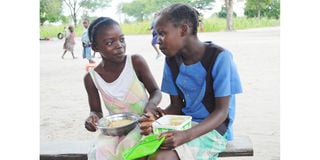AU backs school food drives to boost girls’ education

Two schoolgirls enjoy a high-energy protein supplement provided by Save the Children through the school feeding programme,
What you need to know:
- Idea was fronted during dialogue on gender equality in education on the sidelines of the 35th AU Assembly of Heads of State and Government.
- Leaders in government and the non-governmental sector shared and discussed experiences on national school feeding programmes and the added benefits for schoolgirls.
The African Union (AU) is mooting a gender-responsive school feeding programme in 55 member states to safeguard girls’ education.
The African Union International Centre for Girls and Women’s Education in Africa (AU/CIEFFA), in conjunction with the African Union Department of Education, Science, Technology and Innovation (AUC/ESTI), are behind the proposal to initiate dialogue for the continental programme.
The proposal is meant to increase enrolment and retention of girls in schools. The idea was fronted during a high-level dialogue on gender equality in education held in Addis Ababa, Ethiopia, last week.
The event took place on the sidelines of the 35th AU Assembly of Heads of State and Government under the theme: ‘Developing Africa's human, social and economic capital by increasing the resilience of African girls through quality nutrition and education’.
Leaders from governments and non-governmental sectors shared and discussed their national experiences and the added benefits of increasing enrolment and retention rates of schoolgirls.
Poverty eradication
AU/CIEFFA, a specialised AU institution under the Department of Human Resources, Science and Technology, aims at promoting girls’ and women’s education with a view to ensuring their full participation in poverty eradication and peace promotion for sustainable human development.
Dr Rita Bissoonauth, the head of AU/CIEFFA, told the gathering Covid-19 and other humanitarian crises have undermined the progress of African countries in accomplishing their school food policies.
She, however, registered her optimism that the meeting would enable all actors to come out with enhanced strategies on how to increase girls’ academic resilience through quality nutrition.
Prof Mohamed Belhocine, a commissioner with AUC/ESTI, regretted that Covid-19 came at a time when AU member states were at a crossroads in providing basic services for human development, including the rights to education and food resources.
For his part, Sierra Leone’s Basic and Secondary Education Minister, Dr David Sengeh, called on member states, development partners and non-state actors to invest in human capital through quality nutrition.
He also pushed for the development and adoption of an AU gender-responsive school feeding strategy to retain girls in schools and advocate for more girls in STEM fields to have more African female scientists and innovators crucial to resolving Africa’s problems, including climate change, energy and water issues.
The meeting unanimously agreed to have Sierra Leone champion the AU agenda on girls' education with the support of other member states.
Worrying trends
According to the United Nations Educational, Scientific and Cultural Organisation (Unesco), about 32.6 million girls of primary and lower secondary school age are out of school in sub-Saharan Africa.
This number, the UN agency indicates, rises to 52 million when taking into account girls of upper secondary school age, with millions more at risk as a result of the Covid-19 crisis.
Unesco notes that when families lack the income for food, transport, school fees, uniforms, and essentials like sanitary pads, girls are the first to drop out of school and the first to be failed by the system, thus facing the perils of early marriage, early pregnancy, and abuse.
According to Kenya’s Education ministry, only 30 per cent of children are enrolled in schools in the drought- and hunger-prone areas of Wajir and Mandera. The situation is worse for girls as only 20 per cent are enrolled and even less complete their education.
Parents in some famine-prone areas have on numerous occasions been accused of marrying off their underage daughters in exchange for food and livestock. Girls as young as nine years in some of these regions have been given out to elderly men by their parents as a means of saving their siblings from starvation.
The World Food Programme (WFP) Cost of Hunger Study revealed that 18 per cent of children repeat classes because of stunting; drop out earlier; attain fewer grades; or get up to 3.6 fewer years of school.
When adolescent girls are out of school, they are more vulnerable to forced marriage, early pregnancy, violence and even human trafficking.
Available data by the global agency shows that women and girls are more exposed to hunger and malnutrition than boys; they represent 60 per cent of all undernourished people in the world.
Furthermore, African girls struggle more than boys to access education, with over nine million girls between the ages of six and 11 never going to school at all, compared to six million boys.




